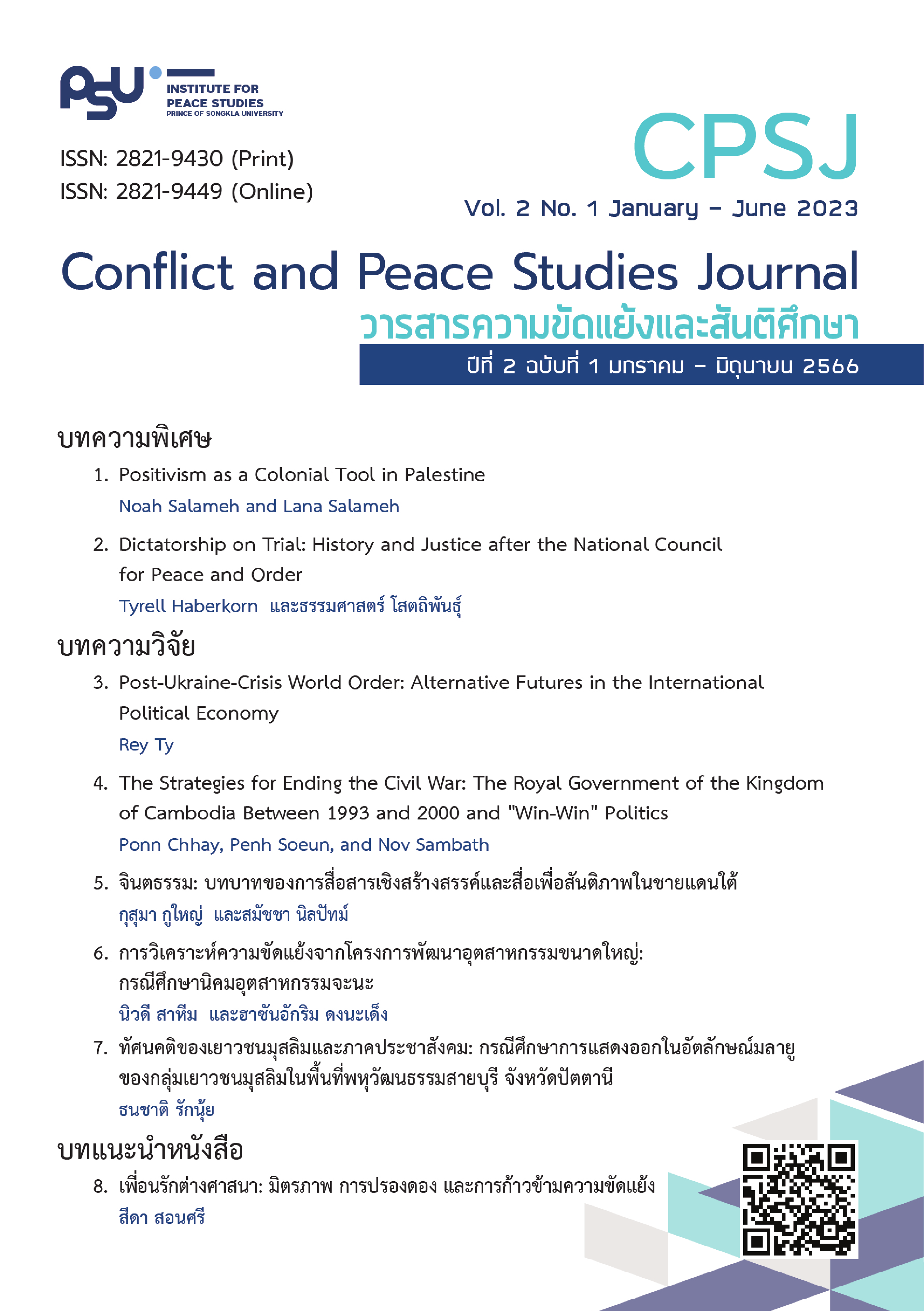Moral Imagination: Roles of Creative Communication and Media for Peace in Thailand’s Deep South
Main Article Content
Abstract
The article aims to present the roles and potential of creative communicators, essence, form and content of creative media for conflict transformation and peacebuilding in Thailand’s deep south. The qualitative research includes interview and focus group discussion methods. The informants consisted of youth, artists, designers, communicators, and social activists.
The research result shows key points for developing the effective creative communication as follows: the creativity in communication to change the positive and negative impacts on individuals and communities affected by violent conflict, peace dialogue and pursuit of the cooperation between people in minimizing the negative impact of conflict and empowering individuals to grow physically, emotionally, and attitudes to cope with some changes that may occur over time in the peace-building process. We found that creative activists apply communication strategies with their creative skills to establish relationships among different people. They create a shared hope and enhance people to realize the importance of freedom. Recognition of personal and social identities and respect for difference is essential things for building peace. However, imagination and creativity are still limited by the socio-cultural structure and power structure that persist in this area and are a key factor in determining the viability of people in the peacebuilding process.
The research conclusion leads to the following suggestions: opening the spaces of creativity and the freedom of expression, providing opportunities for people to think and design their future with creativity, encouraging the participation of people in peace process, and supporting creative communication activities.
Article Details
References
Bräuchler, B. (2022). Creative Peacebuilding and Resistance in Indonesia. The Asian Pacific Journal of Anthropology, 23(1), 1-19.
Castells, M. (2009). Communication and Power. Oxford University Press.
Cohen, C. (n.d.). Creative Approaches to Reconciliation. Brandeis University. Retrieved June 6, 2022, from https://citeseerx.ist.psu.edu/viewdoc/download?doi=10.1.1.498.4233&rep=rep1&type=pdf
Deep South Watch. (2023). Deep South Watch Incident Database. Retrieved April 25, 2023, from https://deepsouthwatch.org/th; https://www.facebook.com/deepsouthwatch/photos/a.204695166210322/5863392020340580/
Engvall, A., & Ropers, N. (2020). The Southern Conflict and Its Transformation: An Overview. In A. Engvall et al. (Ed.), Southern Thailand/Patani, Understanding the Dimensions of Conflict and Peace. Peace Resource Collaborative (PRC).
Fairey, T., & Kerr, R. (2020). What Works? Creative Approaches to Transitional Justice in Bosnia and Herzegovina. International Journal of Transitional Justice, 12, 142-164.
Kooyai, K., Kai-nunna, P., Arttanuchit, J., & Chanakan, P. (2020). Public Communication for Conflict Transformation in Peace Process of Thailand’s Deep South Provinces. (Research Report). Prince of Songkla University.
Lamizet, B. (2002). Politique et identité. Presses Universitaires de Lyon.
Lederach, J. P. (2005). The Moral Imagination. The Art and Soul of Building Peace. Orxford University Press.
Lederach, J. P. (2003). The Little Book of Conflict Transformation. Good Books.
Lederach, J. P. (1997). Building Peace: Sustainable Reconciliation in Divided Societies. United States Institute of Peace Press.
Marin, D. (2013). The Creative Communication. Global Education Magazine: International Day of Democracy. Retrieved August 21, 2021, from http://www.globaleducationmagazine.com/creative-communication/
Muslimited. (2018). Just Kidding SHORT FILM. Retrieved July 14, 2022, from https://www.youtube.com/watch?v=oSgpohqPm1Y
Nilaphatama, S. (2020). Roles of people's media for violence negotiation in deep South Thailand's peace process (Ph.D Thesis). National Institute of Development Administration.
Peace Survey Academic Network. (2021). Survey of People’s Opinion on Peace Process in the Deep South: PEACE SURVEY 6. (Report). Center for Conflict Studies and Cultural Diversity, Prince of Songkla University, Pattani Campus. Retrieved January 15, 2023, from https://cscd.psu.ac.th/th/node/342
Peace Survey Academic Network. (2019). Peace Survey: Voice of the People, Voice for Peace, Report for the Press Conference of Peace Survey 5. (Report) Center for Conflict Studies and Cultural Diversity, Prince of Songkla University, Pattani Campus. Retrieved January 15, 2023, from https://cscd.psu.ac.th/en/node/290
Pink, D. (2006). A Whole New Mind – Why Right-Brainers Will Rule the Future. Penguin-Putnam Inc.
Susaro, R., & Padungpong, C. (2019). Arts of Peace for the Youths in the Three Southern Border Provinces. Journal of Education, Prince of Songkla University, Pattani Campus, (30)2 (May-August), 164-176.
Treré, E. (2019). Hybrid Media Activism: Ecologies, Imaginaries, Algorithms. Routledge.
Yahprung, M. I. (2022) State Multiculturalism and Multiculturalism of the Melayu Muslims: A case study of the dialogue on the Idea of Multiculturalism in Southern Thailand. Journal of Islamic Studies, 13(1), 228-253.

